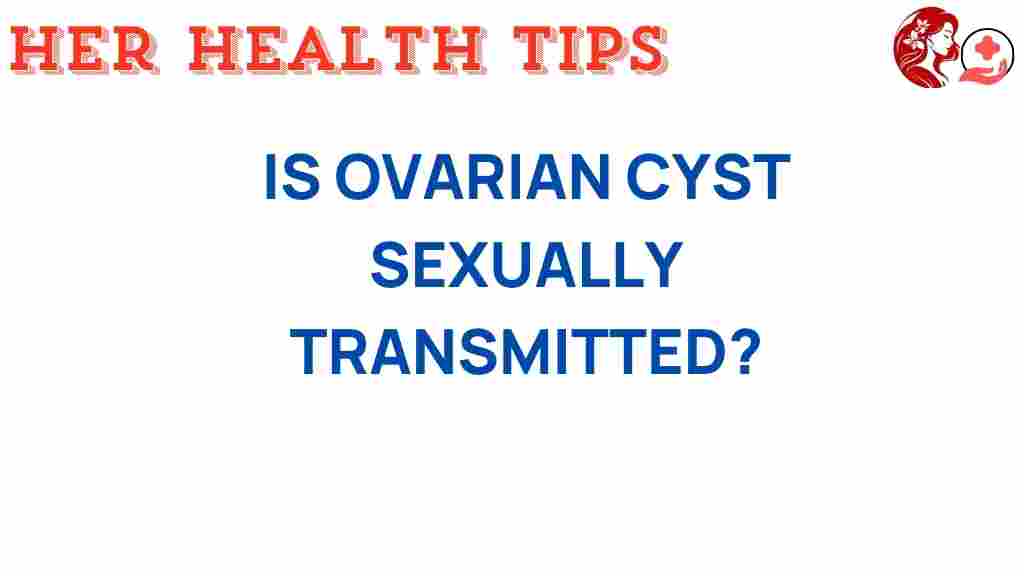Unraveling the Mystery: Are Ovarian Cysts Sexually Transmitted?
Ovarian cysts are a common concern in women’s health, often shrouded in misunderstanding and myths. Many women wonder about their origin, particularly whether they can be sexually transmitted. This article aims to clear up the confusion surrounding ovarian cysts, their symptoms, diagnosis, treatment, and their relationship to reproductive health and fertility.
Understanding Ovarian Cysts
Ovarian cysts are fluid-filled sacs that develop on the ovaries. They are a normal part of the menstrual cycle and are usually benign. Most women will develop at least one ovarian cyst during their lifetime, but many remain unaware, as they often do not present any symptoms.
Causes of Ovarian Cysts
There are several types of ovarian cysts, and they can develop for various reasons:
- Functional Cysts: These are the most common type, formed during the menstrual cycle. They include follicular cysts and corpus luteum cysts.
- Dermoid Cysts: These contain tissue such as hair, skin, or teeth and are formed from cells that produce eggs.
- Cystadenomas: These are benign tumors that can develop on the surface of the ovary and may be filled with a watery or mucous substance.
- Endometriomas: These are associated with endometriosis and occur when tissue similar to the lining of the uterus grows on the ovaries.
Are Ovarian Cysts Sexually Transmitted?
One of the prevalent myths surrounding ovarian cysts is that they can be sexually transmitted. The straightforward answer is no; ovarian cysts are not sexually transmitted. They are not caused by infections or sexually transmitted diseases (STDs).
Ovarian cysts occur due to hormonal changes, particularly during the menstrual cycle. They are a natural occurrence in women of reproductive age and do not result from sexual activity. Understanding this is crucial for addressing concerns related to women’s health.
Common Myths About Ovarian Cysts
Several myths about ovarian cysts can lead to confusion:
- Myth 1: All ovarian cysts are cancerous.
Truth: Most ovarian cysts are benign and do not indicate cancer. - Myth 2: Ovarian cysts are caused by sexually transmitted infections.
Truth: As mentioned, they are not related to STDs. - Myth 3: Ovarian cysts always cause severe pain.
Truth: Many women with ovarian cysts experience no symptoms at all. - Myth 4: Ovarian cysts affect fertility.
Truth: Most cysts do not impact fertility, although some conditions like endometriosis can.
Symptoms of Ovarian Cysts
Most ovarian cysts are asymptomatic, but when symptoms do occur, they can include:
- Pelvic pain or discomfort
- Menstrual irregularities
- Abdominal bloating or swelling
- Pain during intercourse
- Difficulty emptying the bladder or bowel
If you experience severe pain or symptoms like fever and vomiting, it is essential to seek medical help, as these may indicate complications such as cyst rupture or torsion.
Diagnosis of Ovarian Cysts
Diagnosis typically involves:
- Pelvic Exam: A healthcare provider may detect a cyst during a routine pelvic examination.
- Ultrasound: This imaging technique helps visualize the cyst and assess its size and type.
- Blood Tests: Tests such as the CA-125 test can help determine if further evaluation for cancer is necessary.
Treatment Options for Ovarian Cysts
The treatment for ovarian cysts may vary based on the type and symptoms present:
- Watchful Waiting: Many cysts resolve on their own without treatment.
- Medications: Hormonal contraceptives may help regulate the menstrual cycle and prevent future cysts.
- Surgery: In cases of large or persistent cysts, or if there are concerns about cancer, surgical intervention may be necessary.
Impact on Women’s Health and Fertility
Understanding the relationship between ovarian cysts and fertility is essential for women’s health. Most cysts do not affect a woman’s ability to conceive. However, certain conditions associated with cysts, such as polycystic ovary syndrome (PCOS) and endometriosis, may impact fertility.
Step-by-Step Process for Managing Ovarian Cysts
If you suspect you have ovarian cysts or have been diagnosed, follow these steps to manage your condition effectively:
- Monitor Symptoms: Keep track of any symptoms you experience, noting their severity and frequency.
- Consult a Healthcare Provider: Schedule an appointment to discuss any concerns and undergo necessary diagnostic tests.
- Follow Medical Advice: Adhere to the treatment plan suggested by your healthcare provider.
- Maintain a Healthy Lifestyle: Regular exercise, a balanced diet, and stress management can help support reproductive health.
- Regular Check-ups: Stay proactive with routine gynecological exams to monitor your ovarian health.
Troubleshooting Tips
If you experience recurring symptoms or have concerns about cysts, consider the following troubleshooting tips:
- Keep a log of your menstrual cycle to identify patterns or irregularities.
- Stay informed about your reproductive health by reading reliable sources.
- Reach out to support groups or forums for women experiencing similar issues.
- Discuss any new symptoms or concerns with your healthcare provider promptly.
Conclusion
In conclusion, ovarian cysts are a common part of women’s health that are often misunderstood. They are not sexually transmitted and are typically benign. Understanding the myths, symptoms, diagnosis, and treatment options is crucial for managing ovarian cysts effectively. By staying informed and proactive about reproductive health, women can navigate their health concerns with confidence.
For more information on women’s health and ovarian cysts, visit WomensHealth.gov. If you are concerned about ovarian cysts or other reproductive health issues, consult your healthcare provider for personalized advice.
This article is in the category Reproductive and created by HerHealthTips Team
